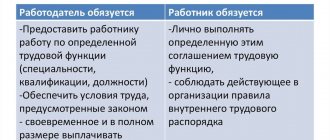Employers and employees often look for opportunities to resolve disputes between them in some way.
Dear readers! To solve your specific problem, call the hotline or visit the website. It's free.
8 (800) 350-31-84
One of these methods should be considered a collective agreement. However, in some cases, organizations do not have a trade union that could in any way represent the interests of employees in the collective agreement.
Parties to the agreement
Negotiations are being conducted by representatives of both sides.
A trade union usually acts on behalf of the employee if it includes more than half of the team members. It happens that several trade union cells operate at an enterprise, then a single collegial body is formed according to the principle of proportionality. The trade union, which will be entrusted with representing the interests of all employees of the enterprise, can be elected by secret ballot. At such a meeting, in order to consider its decision lawful, at least half of the total number of employees of the enterprise must be present.
Not only full-time employees, but also invited persons can represent the interests of the team. For example, legal advisers working with an enterprise on the basis of a contract.
The employer is represented by citizens whom he appoints by appropriate order. Among them:
- head of the enterprise;
- individual entrepreneur;
- employees officially authorized by management.
For all the nuances of this document and its role in labor relations at enterprises, watch the video:
Collective agreement for LLC: procedure for drawing up and signing
Reviews ConsultantPlus
The collective agreement comes into force immediately upon completion of the collective negotiations, the result of which it is. Such negotiations, by virtue of Part 1 of Article 36 of the Labor Code of the Russian Federation, should be held by representatives of workers and employers, during which the creation of this important document should be discussed.
A collective agreement is not binding on every employer. However, the organization’s management cannot refuse the employees’ proposal to conclude it; for this, administrative liability is even provided for under Article 5.28 of the Code of Administrative Offenses of the Russian Federation. Therefore, any manager or owner of a limited liability company or any other organization must be prepared to receive an offer to conduct collective bargaining and conclude an agreement. This means that it is necessary to study in advance the question of what procedure for concluding a collective agreement is provided for by current legislation and what should be written in it. Let's deal with these questions in order.
Reviews ConsultantPlus.
How is it different from an employment contract?
The difference between labor and collective agreements lies in the definition itself:
- An employment contract is an agreement between an individual and an employer under which the employee will perform his or her job under specified conditions and receive a salary for it. The organization, for its part, undertakes to provide the person with conditions for comfortable and safe work and timely pay remuneration.
- A collective agreement is an agreement between representatives of both parties that establishes mutual obligations. They relate to the implementation of production plans, increasing productivity, reducing the risk of injury, improving working conditions, etc.
In other words, an employment contract affects the rights and obligations of each individual employee. Its preparation is a mandatory condition for employment. The collective regulates the additional responsibility of all members of the team to achieve common goals.
SECTION 4. WORKING TIME AND REST TIME
4.1. Employees are provided with a five-day, 40-hour work week with 2 days off, with the exception of employees for whom the current legislation and this collective agreement have established a reduced working time.
4.2. The organization may use reduced working hours (at the request of the employee), in addition to the cases provided for by current legislation, for:
1) women with children under 8 years of age; 2) persons who have partially lost their ability to work at work.
4.3. The duration of work at night is equal to the duration of work during the day in cases where this is necessary due to working conditions, as well as for shift work with a 6-day work week with 1 day off.
4.4. In case of production necessity, the employer may introduce a division of working time into parts, taking into account the opinion of the elected trade union body.
4.5. Provide breaks for rest and food to employees from 13:00 to 14:00.
4.6. At jobs where, due to production (work) conditions, it is impossible to provide a break for rest and food, provide the employee with the opportunity to rest and eat food during working hours.
4.7. Sunday is considered a general day off. The second day off is Saturday.
4.8. Provide annual additional paid leave to employees engaged in work with harmful and (or) dangerous working conditions, and to employees with irregular working hours.
4.9. Provide employees with unpaid leave for family reasons and other valid reasons for a period of time by agreement between the employee and the employer.
4.10. The regime of working hours and rest time is specified in the internal labor regulations, shift schedules, and vacation schedules.
Main provisions of the document
A collective agreement is a fairly free document. Its content, development time, and composition of the commission for adoption are determined by voluntary agreement of the parties.
In fact, any aspects related to work activities can be specified in the contract. At the same time, there are obligations that must be indicated in this document in accordance with Article 13 of the Federal Law “On Collective Agreements”. This:
- wage calculation principle, size, possible remuneration, compensation, benefits, additional payments;
- indexation of wages in accordance with inflation, exceeding the plan, changes in economic factors and other factors;
- duration of working hours, number of vacations, conditions for providing additional days for rest;
- working conditions, compliance with safety regulations, care for the health of personnel;
- insurance: both social and voluntary medical;
- respecting the interests of the company’s employees in the event of property privatization;
- creating conditions for conducting trade union activities or other bodies that represent the interests of workers;
- conscientious fulfillment of production tasks with timely execution by the employer of all clauses of the contract.
The agreement may also include additional vacations, pensions, business trips, benefits for certain groups, meals, compensation for transportation costs, etc. The document cannot contain provisions that contradict the law and worsen the situation of employees of an enterprise or organization.
Conditions in the collective agreement
Article 41 of the Labor Code lists a number of conditions that are recommended to be included in the agreement:
- about salary (payment method: cash through the cash register or transfer to a card, payment terms: what days to wait for the transfer, amount: not less than the minimum wage);
- about benefits and compensation: how and in what cases employees can count on financial support;
- on salary indexation: increase in payments by the percentage of inflation;
- on retraining, retraining, advanced training of employees;
- about the work schedule: the beginning and end of the working day, working days, lunch breaks and technology breaks (for example, for employees who use computers at work, you can set 10-minute breaks every hour);
- about vacations: duration, procedure for granting;
- on labor protection of certain categories of employees (youth, pregnant women, families);
- on health protection at work;
- on guarantees for on-the-job students;
- about payment for food;
- on the refusal to strike, subject to the employer fulfilling his obligations under the collective agreement.
It is possible to establish other conditions, but they should not contradict the Labor Code in terms of worsening the situation of employees. For example, you can specify additional conditions:
- about additional days off and their payment (in the case of a wedding, funeral, birth of a baby, on September 1, etc.);
- about New Year's gifts for children of employees;
- about financial assistance in difficult life situations;
- on provision of places in kindergarten;
- about sanatorium treatment;
- about service housing;
- on travel compensation (providing travel cards).
For what period is it concluded?
The maximum period for which an agreement can be concluded is 3 years . It comes into effect from the day it is signed by both parties. After expiration, it can be extended, but not more than for another 3 years.
If during the validity period the organization changed its name, type of government agency or leader, the validity of the agreement remains valid. The same applies to reorganization, merger, division, and incorporation of a company.
If the organization's form of ownership has changed, the collective agreement continues to be valid for another 3 months from the date of the appearance of the new owner. After this period expires, the new employer or team has the right to take the initiative to conclude an agreement with the same or changed conditions.
Rules and procedure for drawing up a collective labor agreement in the absence of a trade union organization
Employers and employees often look for opportunities to resolve disputes between them in some way.
Dear readers! To solve your specific problem, call the hotline or visit the website. It's free.
One of these methods should be considered a collective agreement. However, in some cases, organizations do not have a trade union that could in any way represent the interests of employees in the collective agreement.
Rules and procedure for drawing up a collective labor agreement in the absence of a trade union organization.
Issues related to remuneration
We are talking about the wage system and its size. The contract can include the amounts of tariff rates and salaries, as well as additional payments that are compensatory in nature. In addition, it is possible to introduce systems of additional payments and bonuses of an incentive nature and prescribe bonus systems (Part 2 of Article 135 of the Labor Code of the Russian Federation).
How to correctly draw up and formalize a collective agreement for 2020 and how it differs from the 2021 agreement.
Collective labor agreement: what should it contain, how to approve it,
Nevertheless, the Labor Code of the Russian Federation establishes the obligation of the administration of a business entity to conclude a collective labor agreement if at least one of the company’s employees expresses such a desire. The same act establishes the period within which it is necessary to begin negotiations on concluding this agreement - seven days.
Thus, this act can exist if the company or individual entrepreneur has at least one employee. In this case, a party to the organization may be represented by a director or other official who, in accordance with the constituent documents, has the right to represent the company.
The side of those working at the enterprise must be represented by representatives of the trade union created in the organization, or by the company employees who received the majority of votes in the elections. If
The same act establishes a period within which it is necessary to begin negotiations on the conclusion of this agreement - seven days.
In what cases is a collective agreement concluded and for what period?
The Labor Code of the Russian Federation establishes the concept and content of a collective agreement, but the management of the company and its employees carry out the conclusion of a collective agreement, so whether it is valid or not depends on them.
This local regulatory act does not apply to enterprise standards that must be present in the company. Since these rules may be reflected in other documents.
Nevertheless, the Labor Code of the Russian Federation establishes the obligation of the administration of a business entity to conclude a collective labor agreement if at least one of the company’s employees expresses such a desire.
The same act establishes the period within which it is necessary to begin negotiations on concluding this agreement - seven days. Thus, this act can exist if the company or individual entrepreneur has at least one employee.
In this case, a party to the organization may be represented by a director or other official who, in accordance with the constituent documents, has the right to represent the company. The side of those working at the enterprise must be represented by representatives of the trade union created in the organization, or by the company employees who received the majority of votes in the elections.
There may be several trade unions at an enterprise, then who will represent the side of workers in the organization will be determined in accordance with the Labor Code of the Russian Federation.
If the employer is an individual registered as an individual entrepreneur, then he must independently sign this local regulatory act.
There are industry and inter-industry agreements that define provisions for regulating the relationship between employee and management. Then the collective agreement should be based on them.
The legislation determines that the duration of an approved collective agreement between the management of a company and its employee cannot exceed three years. In this case, the calculation of the validity period begins from the date specified in the agreement itself or the date of its signing.
If the employer is an individual registered as an individual entrepreneur, then he must independently sign this local regulatory act.
Sample invitation to negotiations on a collective agreement from the primary trade union organization
Labor legislation does not provide for special requirements for negotiations. Participants independently determine the procedure for conducting them and the timing (Article 37 of the Labor Code of the Russian Federation). But management must respond within 7 calendar days from the date of receipt of the proposal. Article 40 of the Labor Code of the Russian Federation determines that it is necessary to sign a collective agreement within 3 months from the date of the start of negotiations - from the date when the initiators received a response.
In order for the negotiations to be productive, and for the sample collective agreement for 2021 to comply with the norms of the Labor Code of the Russian Federation and the peculiarities of the economic activities of a particular company, the owners of the organization are required to provide the representatives of the collective with the following information:
- information about the financial position of the company;
- data on the staff of employees;
- information about the company's development plans for the near future;
- product strategy data;
- corporate policy;
- other information (including those constituting a trade secret).
If the information is confidential, negotiators are warned about access to it and undertake an obligation of non-disclosure. Persons who violate such obligations may be subject to disciplinary, administrative, civil, and even criminal liability. Employers themselves are also responsible, including for refusal to provide the required information, under Article 5.29 of the Code of Administrative Offenses of the Russian Federation.
Administrative liability is also provided for unilateral refusal by the employer to negotiate. The fine for evasion, according to Article 5.28 of the Code of Administrative Offenses of the Russian Federation, ranges from 1,000 to 3,000 rubles.
Once the project is approved, it can be signed.
Document text:
5.2. When reducing the number or staff of employees, at least 2 months before dismissal, warn the employee in writing, as well as notify the state employment service about the upcoming dismissal of the employee, indicating his profession, specialty, qualifications and wages.
Collective agreements cannot contain conditions that limit the rights or reduce the level of guarantees of employees in comparison with those established by labor legislation and other regulatory legal acts containing labor law norms. If such conditions are included in the collective agreement, then they are not subject to application in accordance with Part 2 of Art. 9 of the Labor Code of the Russian Federation.
The validity period of the collective agreement is no more than 3 (three) years . It is calculated from the moment it comes into force, that is, from the day it is signed by the parties or from the date established by the collective agreement (Article 43 of the Labor Code of the Russian Federation).
The amount of the employee's official salary is established in the employment contract.
What it is
A collective agreement (CA) is an official document necessary to regulate labor and other relations between the employer and employees of the organization. The concept of CD is established by law in Art. 40 Labor Code of the Russian Federation.
The contract of agreement can be concluded at the enterprise as a whole or in its individual branches. In the first case, the document has legal force for an LLC or individual entrepreneur in general, and in the second - only for a specific division, that is, employees of other departments or branches are not required to comply with the provisions of the agreement.
Also, a company representative office located in another country can develop its own version of the agreement.
Parties to the agreement:
- employees of the enterprise represented by representatives. This may be a trade union organization or a selected individual;
- employer: individual entrepreneur, head of the enterprise or his authorized representative. For example, a lawyer or deputy director.
Most employers and full-time employees are wondering whether a collective bargaining agreement is mandatory or not in 2021. According to Russian law, such an agreement is not necessary when concluding an employment agreement.
Such a document is drawn up at the initiative of the employer or by an employee of the company. The initiative must be expressed in writing. And the other party is obliged to begin negotiations within a week after notification.
According to the law, the employer is required to sign the contract if the initiator of the procedure was employees of the enterprise. In case of refusal, the employer will bear administrative liability in the form of a fine in the amount of 3-5 thousand rubles.
Violations also include:
- avoidance or refusal to negotiate;
- ignoring deadlines;
- refusal to provide the required information.
For such violations, the fine will be from 1 to 3 thousand rubles.
If neither party has taken the initiative to conclude a collective agreement, then there is no need for it. The law does not provide sanctions for the absence of a document.
Therefore, the employer’s obligation to enter into such an agreement at the request of regular staff should not be perceived negatively.
Collective agreement in a pharmacy: sample
By analogy, we are drawing up a similar collective agreement for a pharmacy. Below is an example of filling it out.
Download a sample collective agreement in a pharmacy (.doc)
Sample collective agreement 2021.
Is it required or not?
The Labor Code of the Russian Federation does not indicate the need for mandatory conclusion of collective agreements.
Articles 21 and 22 only spell out the right that both parties have. No one has the right to force an employee to join an agreement that has already been concluded before his employment. Thus, if neither the employer nor the employees took the initiative to create such a document, their relations will be governed exclusively by employment contracts. There is no legal liability for this. The situation is different if one of the parties expressed a desire to conclude such an agreement. Then she is obliged to send a written proposal to start collective bargaining. In this case, the other party is given seven days to respond to this letter. The response should indicate the representatives who will participate in the negotiations.
In practice, the initiator of concluding a collective agreement is usually the employees.
From the moment they send an official notification, the employer already has responsibility. He cannot refuse negotiations. Otherwise, this will result in administrative penalties.
In a series of regulations, collective agreements are given a special role. With its help it is possible to solve a number of problems:
- stabilize legal relations between employees and enterprise management;
- increase staff motivation;
- achieve a clear and understandable system of remuneration and bonuses;
- optimize costs;
- improve working conditions;
- provide material support and social protection for people.
You can find out about all aspects of working under a fixed-term employment contract here.
If you are interested in what the minimum wage is in Russia in 2021, read this article.
Contents of the agreement
There are no requirements for the structure and content of the document at the legislative level. However, when a decision is made in favor of creating a local act, the implementation of the laid down provisions becomes the responsibility of the parties, regardless of the form of ownership and business system.
An approximate list of issues that would be appropriate to resolve is recommended by the TC:
- systems for the formation of the wage fund taking into account the consumer price growth index;
- time of work and rest, including the duration of vacation periods;
- labor protection and safety conditions of the production cycle at each stage;
- conditions for the provision of payments from the material incentive fund;
- additional guarantees and compensation payments.
An example of common typical mistakes: the inclusion of financial sanctions for violation of labor discipline, overtime work on the initiative of the administration without the consent of the employee, the performance of a number of duties not provided for in individual contracts and contrary to inter-industry tariff agreements.
On November 6, 2003, Rostrud approved a sample collective agreement that can be used as a template. The Labor Department made a reservation regarding the advisory nature of the application.
Download the Model of the collective agreement, approved on November 6, 2003 by Rostrud (118.5 KiB, 255 hits)
Registration procedure
The signed agreement, its annexes, as well as a protocol of disagreements, if any, should be sent to the Ministry of Labor. He will be registered there. 7 days are allotted for this.
Federal law establishes employer liability for evading a collective agreement, disrupting commission meetings, and ignoring employee initiatives. The fine can reach up to 50 minimum wages.
There is also liability for failure to fulfill the terms of an already concluded contract. The head of the company also faces a fine for obstructing the work of the commission when drawing up a draft document. All administrative penalties are imposed by the court.
Drawing up a collective agreement in the absence of a trade union organization
Drawing up a collective agreement in the absence of a trade union organization
Almost all services of the enterprise are involved in the process of concluding a collective agreement: legal, financial and economic (including accounting), personnel, as well as trade unions and associations. However, it is no secret that many enterprises do not have trade union organizations, and the need to adopt a collective agreement is dictated by the realities of the time. The article examines the legal aspect of concluding a collective agreement in the absence of a trade union organization at the enterprise.
In accordance with Art. 40 of the Labor Code of the Russian Federation, a collective agreement is a legal act that regulates social and labor relations in an organization or an individual entrepreneur and is concluded by employees and the employer represented by their representatives. By virtue of Art. 9 Labor Code of the Russian Federation collective
contract is one of the forms of regulation of labor relations. The execution of this agreement is mandatory for its parties (Articles 32, 55 of the Labor Code of the Russian Federation, Articles 5.27-5.34 of the Code of Administrative Offenses of the Russian Federation).
According to Art. 23, 25 of the Labor Code of the Russian Federation, the parties to a collective agreement as a legal act of social partnership in the sphere of labor are employees and employers. Representatives of employees Art. 29 of the Labor Code of the Russian Federation names trade unions and their associations, other trade union organizations provided for by the charters of interregional unions, and other representatives of workers.
Article 31 of the Labor Code of the Russian Federation states that in cases where the employer’s employees are not united in any primary trade union organizations or none of the existing primary trade union organizations unites more than half of the employees of this employer and is not authorized to represent the interests of all workers in social partnership at the local level, at a general meeting (conference) of employees, another representative (representative body) from among the employees may be elected by secret ballot to exercise these powers. In accordance with Art. 399 of the Labor Code of the Russian Federation, a meeting of workers is authorized if more than half of the workers participate in it, a conference - if more than two thirds. It should be noted that the Labor Code of the Russian Federation does not define other differences between a meeting and a conference of workers.
Articles 33, 34 of the Labor Code of the Russian Federation establish that the interests of the employer during collective bargaining are represented by the head of the organization, individual entrepreneur or other authorized person, and in relation to employers - state (municipal) institutions, representatives of employers can be state (municipal) authorities.
The initiator of collective negotiations can be any party to the social partnership (Articles 21, 22, 36 of the Labor Code of the Russian Federation). In accordance with Art. 36 of the Labor Code of the Russian Federation, representatives of a party who have received a proposal in writing to begin collective negotiations are required to enter into negotiations within seven calendar days
from the date of receipt of this proposal, sending a response to the initiator of collective bargaining indicating representatives from their side (to participate in the work of the collective bargaining commission) and their powers, while the day of the start of collective bargaining is the day following the day the initiator received collective bargaining answer.
Article 54 of the Labor Code of the Russian Federation provides that an employer or his representatives who evade participation in collective negotiations to conclude or amend a collective agreement or who unlawfully refuse to sign an agreed upon collective agreement may be subject to a fine in the amount established in Art. 5.28, 5.30 Code of Administrative Offenses of the Russian Federation.
To conduct collective negotiations, prepare projects and conclude collective agreements, a commission is formed from representatives of the parties endowed with the necessary powers (Article 35 of the Labor Code of the Russian Federation). By virtue of Art. 39 of the Labor Code of the Russian Federation, persons participating in collective negotiations and the preparation of a draft collective agreement are released from their main work while maintaining their average earnings for a period of no more than three months. Representatives of workers participating in collective negotiations during the period of their conduct cannot be subject to disciplinary action, transferred to another job or dismissed at the initiative of the employer without the prior consent of the body that authorized these workers to represent, except in cases of termination of the employment contract for committing an offense for which in accordance with the Labor Code of the Russian Federation and other federal laws, dismissal from work is provided for.
Representatives of the parties participating in collective negotiations are free to choose issues for regulating social and labor relations to be reflected in the collective agreement (Article 37 of the Labor Code of the Russian Federation), the content and structure of which is determined by the parties to the social partnership.
It should be noted that in accordance with Art. 37 of the Labor Code of the Russian Federation, the parties are obliged to provide each other with available information about collective negotiations within two weeks. Moreover, in Art. 399 TK
The Russian Federation indicates the need for written requirements to the employer, including the inclusion of conditions in the collective agreement.
The recommended list of obligations of employees and employers that can be reflected in a collective agreement is determined by Art. 41 Labor Code of the Russian Federation:
– forms, systems and amounts of remuneration;
– payment of benefits, compensation;
– a mechanism for regulating wages taking into account rising prices, inflation levels, and fulfillment of indicators determined by the collective agreement;
– employment, retraining, conditions for releasing workers;
– working hours and rest time, conditions for granting and duration of vacations;
– improving the working conditions and safety of workers, including women and youth;
– respect for the interests of workers during the privatization of state and municipal property;
– environmental safety and health protection of workers at work;
– guarantees and benefits for employees combining work with training;
– health improvement and recreation for employees and members of their families;
– partial or full payment for employees’ meals;
– control over the implementation of the collective agreement, the procedure for making changes and additions to it, the responsibility of the parties, ensuring normal conditions for the activities of employee representatives, the procedure for informing employees about the implementation of the collective agreement;
– refusal to strike if the relevant conditions of the collective agreement are met;
– other issues determined by the parties.
At the same time, by virtue of Art. 41 of the Labor Code of the Russian Federation, in a collective agreement, taking into account the financial and economic situation of the employer, benefits and advantages for employees, working conditions that are more favorable in comparison with those established by laws, other regulatory legal acts, and agreements can be established.
The procedure for developing a draft collective agreement and concluding a collective agreement is established by the parties participating in the negotiations (Article 42 of the Labor Code of the Russian Federation). To help members of commissions for the preparation of collective agreements, by decision of the board of the Ministry of Labor of the Russian Federation dated November 6, 2003, a recommended layout of a collective agreement was developed and approved.
In accordance with Art. 40 of the Labor Code of the Russian Federation, the collective agreement must
be signed on agreed terms within three months from the start of negotiations, while unresolved disagreements are formalized in a protocol of disagreements (Article 38 of the Labor Code of the Russian Federation) and can be the subject of further collective negotiations or resolved in the manner determined by the Labor Code (including according to the rules of Chapter 61 of the Labor Code of the Russian Federation), other federal laws.
As established by Art. 43 of the Labor Code of the Russian Federation, the validity period of a collective agreement cannot be more than three years from the date of its signing or from the date established by the collective agreement, while the parties can repeatedly extend the validity of the collective agreement for three years.
It is also important that, in accordance with Art. 40, 43 of the Labor Code of the Russian Federation, a collective agreement can be concluded in the organization as a whole, in its branches, representative offices and other separate structural units, and therefore, its effect can extend to all employees of the organization or individual entrepreneur. The validity of a collective agreement concluded in a branch, representative office or other separate structural unit of an organization applies to all employees of the corresponding unit.
Article 43 of the Labor Code of the Russian Federation establishes the legal consequences of various procedures for reorganizing an enterprise, liquidation procedures and changing the owner of an enterprise:
– the collective agreement remains valid unchanged in the event of a change in the name of the enterprise, reorganization in the form of transformation of the enterprise and (or) change of manager;
– the collective agreement is valid for the entire period of reorganization or liquidation during reorganization in the form of merger, accession, separation, division, as well as liquidation of the enterprise;
– the collective agreement is valid for three months from the date of transfer of ownership rights when changing the form of ownership of the organization.
In the event of a reorganization or change of ownership, either party has the right to send the other party a proposal to extend the previous collective agreement for a period of up to three years.
According to
Art. 44 of the Labor Code of the Russian Federation, a collective agreement may be amended or supplemented in the manner established for the conclusion of collective agreements, or in the manner provided for in the collective agreement.
The collective agreement is sent by the employer for notification registration to the relevant labor authority within seven days from the moment of its signing, while the entry into force of the collective agreement does not depend on the fact of registration (Article 50 of the Labor Code of the Russian Federation). The purpose of registration is to identify conditions that worsen the situation of workers. These terms of the collective agreement are invalid and cannot be applied.
Article 51 of the Labor Code of the Russian Federation stipulates that control over the implementation of the collective agreement is carried out by the parties to the social partnership, their representatives, and the relevant labor authorities, while persons guilty of violating or failing to fulfill the obligations provided for by the collective agreement are subject to a fine in the amount provided for in Art. 5.31 Code of Administrative Offenses of the Russian Federation.
“Budget organizations: accounting and taxation”, N 8, August 2008.
Drawing up a collective agreement in the absence of a trade union organization.
Typical filling sample for individual entrepreneurs
Is a collective agreement necessary for an entrepreneur at all? Yes, if this request came from his employees. Even here there are no exceptions to the rules. The collective agreement form can be downloaded here.
The legislative norms of the Labor Code of the Russian Federation establish the same requirements for the formation of a collective agreement for both enterprises, organizations, and individual entrepreneurs.
A sample collective agreement that is used by individual entrepreneurs can be found on the Internet behind the letter. According to the principle of document formation and the procedure for its consideration, collective agreements from organizations, LLCs, are practically no different from the example for entrepreneurs.
Also, it is not canceled if the head of the branch or department himself terminated the personal contract with this organization.
How to draw up a collective agreement?
One of the parties sends a written proposal to the other (employees to employer or vice versa). For example, workers want to conclude a collective agreement in 2021. In this case, the employer must enter into negotiations within a week from the day he received the offer. He must respond to the employees, indicating in his response his representatives indicating their powers.
In order for both parties to be satisfied with the content and structure of the collective agreement, a negotiation commission must be created, which includes representatives of both parties. The composition of the commission is approved by order in free form. Collective negotiations are being held, during which a model of the collective agreement for 2021 is being created. If no one has any objections to the drawn up layout, then authorized representatives of both parties sign the contract.
The rules for concluding are the same for entrepreneurs and organizations, thus, a standard collective agreement of a budgetary institution and a collective agreement of another organization will not have significant differences: the procedure for negotiations, approval, and approval of the agreement is the same for all companies.
Payment and standardization of labor in the company;








